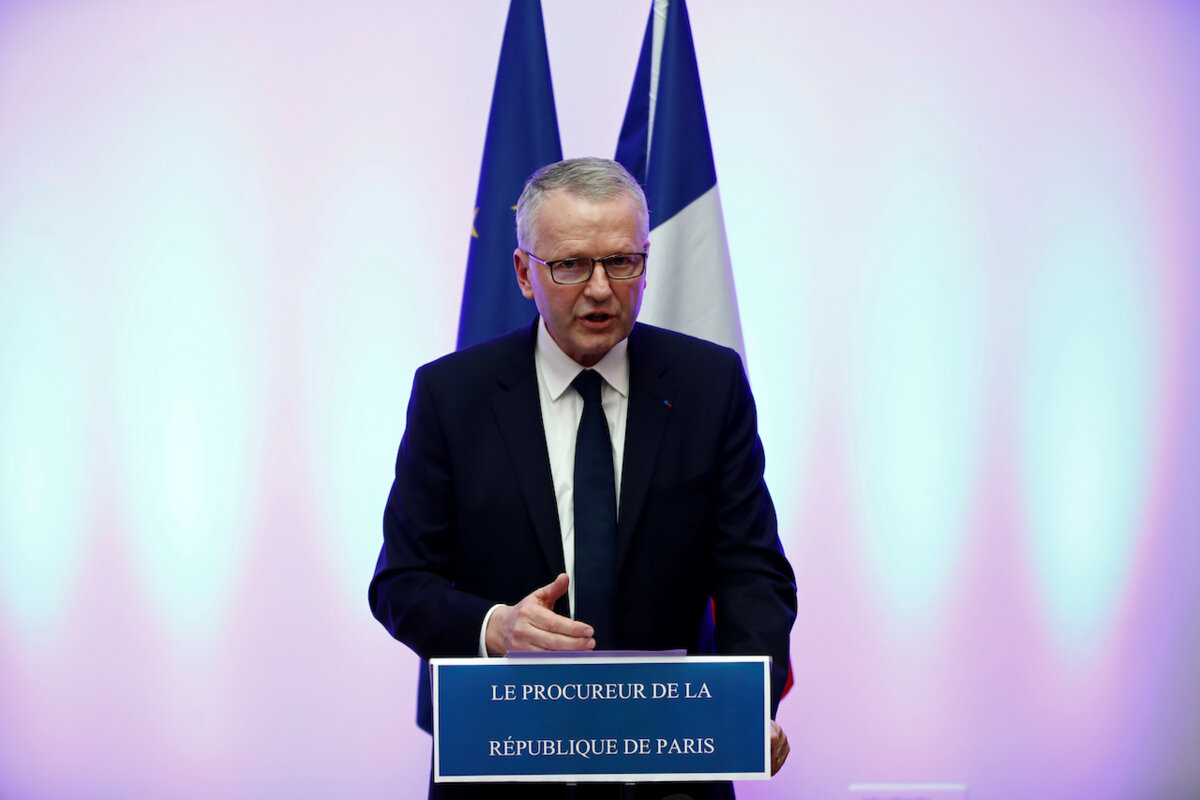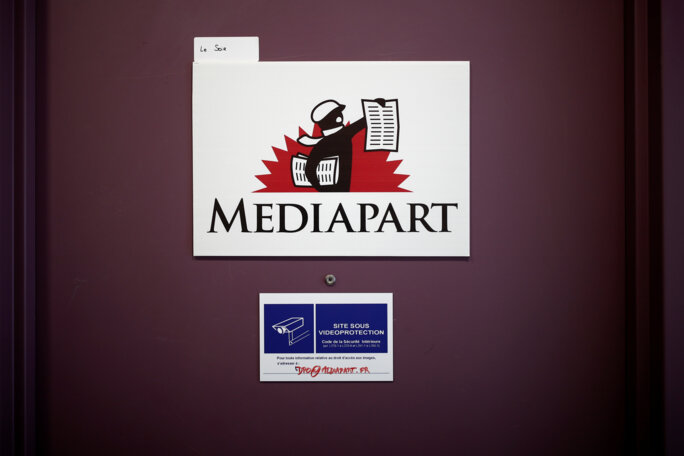It was revealed this week that the French domestic intelligence agency, the DGSI, has summoned for questioning Ariane Chemin, a senior reporter with French daily Le Monde, over her investigations into President Emmanuel Macron’s disgraced security aide Alexandre Benalla.
It is the latest in a recent series of intimidating moves targeting investigative journalists in France. In February, a group made up of two public prosecutors and three police officers from the serious crime squad, the Brigade criminelle, arrived at Mediapart’s offices in Paris in an attempt to search them following Mediapart’s investigations into the Benalla affair (the group were refused entry). Earlier this month, two journalists from the online investigative collective Disclose, and another from public broadcaster Radio France, were questioned by the DGSI in connection with their reports revealing how the French government had misled the public over the use of French-made weapons in the war in Yemen.
These three recent events have in common the role of Paris public prosecutor Rémy Heitz. He is, on each occasion, the magistrate with ultimate authority over these preliminary investigations, the nature of which – with the summoning of journalists or the attempt to search their premises – have caused outrage both in France and abroad, regarded as blunt attacks against the liberty to inform and a journalism which upsets the powers that be.

Enlargement : Illustration 1

The legal accusations vary according to the circumstances. In the most recent case, Le Monde reporter Ariane Chemin is summoned for questioning by the DGSE spy agency on May 29th following an article she wrote in February. This detailed how Chokri Wakrim, a French army officer who acted for a short time as a private security agent for a Russian oligarch as part of a contract negotiated by Benalla, was a member of a unit of France’s special services, a revelation initially reported by French daily Libération.
Wakrim lodged a formal complaint against those responsible for the revelation, citing article 413-14 of the criminal code, according to which revealing “by whatever means” the identity of a member of the French army’s special forces is subject to prosecution and a potential sentence of five years in jail and a fine of 75,000 euros.
It may be regarded as quite legitimate that Wakrim, given the terms of the law, lodged a complaint over the revelation. But the decision to summon a journalist, who simply carried out her duty, for questioning as a suspect, notably by the intelligence services, means that the Paris public prosecution services have chosen to criminalise the disclosure of information that is both true and of public interest. For it must be underlined that the reporting in question concerns the otherwise hidden aspects of Benalla’s private contracts with Russian oligarchs, and which is the subject of a judicial probe into suspected “corruption”.
Which is why, in a short editorial published on Wednesday and signed by Le Monde’s editor in chief Luc Bronner, he spoke of a summons that was “disturbing”.
But it was not the first time that prosecutor Heitz has embarked on disturbing practices. It was under his authority that two journalists from the online reporters’ collective Disclose, Geoffrey Livolsi and Mathias Destal, were questioned by the DGSI as suspects on May 16th, following a complaint filed by the French defence ministry. Benoît Collombat, of the investigative journalism unit of public broadcaster Radio France, who took part in the investigation, was also questioned by the DGSI.
Their supposed crime was to have made public, in reports co-published by several media including Mediapart, the existence of a report drawn up by the French armed forces’ military intelligence agency, the DRM, which detailed a thorough list of French-made weapons sold to Saudi Arabia and the United Arab Emirates (UAE) that are deployed on the frontline in the Saudi-led military coalition’s offensive in Yemen – a war that the United Nations has described as causing “one of the worst humanitarian crises in the world”.
The revelation of the DRM report contradicted, for the first time in public, the recurrent statements of the French government which insisted that the powerful arms sold to Saudi Arabia and the UAE were only for defensive use, and not employed on the frontline of combat in Yemen. Numerous international NGOs have since offered their support to the the work of the journalists from Disclose and Radio France.
In sum, the three journalists are accused of compromising France’s defence secrets regarding an issue where the French government has compromised both the truth and the ethics of transparency towards its citizens.

Enlargement : Illustration 2

In early February, public prosecutor Rémy Heitz, 55, gained notoriety in international press reports (in the US notably in articles in The New York Times and Washington Post) after the failed attempt to carry out a police search of the offices of Mediapart, which he authorised following Mediapart’s investigations and revelations in the Alexandre Benalla scandal.
More precisely, the move followed a report by Mediapart which cited the transcript of a conversation between Benalla and his comparse Vincent Crasse, a former security manager with President Emmanuel Macron’s LREM party, which revealed how they had breached a bail order not to communicate together, and in which they discussed a security contract they had mounted together with a Russian oligarch close to Vladimir Putin (and also Benalla's ongoing communications with Macron; see more here and here).
The attempted raid on Mediapart’s office, which Mediapart has since responded to with a formal complaint to the justice authorities, was in fact prompted by a report to the prosecution services sent by Prime Minister Édouard Philippe’s office, whcih detailed rumours about the location and nature of the secret recordings that it had received from a journalist with the far-right magazine Valeurs actuelles.
While the journalistic profession is obviously not above the law, there is a very clear legal framework by which its members in France may be judged, namely the landmark law of July 29th 1881 which remains the defining legislation that sets out the freedom and limitations of the exercise of the profession. But all the recent investigations launched by France’s public prosecution services regarding the Benalla affair and that of the sale of French weapons to the protagonists in the war in Yemen have carefully attempted to bypass the 1881 law.
The result is that, beyond the intimidation of those journalists who have simply carried out their professional duties, the prosecution services' probes, whatever their final result, have lent a legal legitimacy and a procedural framework for hunting down press sources, sources without which news reporting would be reduced to ‘believe-us’ claims.
So to express revolt against attempts to raid the premises of journalists or the questioning of journalists by spy agencies must in no way be regarded as the corporatist, defensive knee-jerk reaction of a profession. It is rather the defence of a fundamental right for citizens, namely that of the right to know. A journalist’s job sometimes, if not often, consists of obtaining information from those who are not supposed to reveal it. Which is the essence of the notion of a journalist’s right to guarantee the secrecy of their sources.
The recurrent attacks against that principle by the prosecution services cannot be resumed simply to the excesses of one man. The situation is, unfortunately, more complex than that. Within the context of France’s institutions, the public prosecutor occupies a role that is of ulterior importance, and in the case of Rémy Heitz, in the context of the current government, that is also the case. As a magistrate who plays a central role in judicial matters – he is the person who decides the launching of investigations, and the parameters for the investigations – chief Paris public prosecutor Heitz is, like all public prosecutors in France, subject to the hierarchy above him, namely the political executive which appoints, promotes or sidelines prosecutors according to its wishes.
In the precise case of Rémy Heitz, his appointment by President Macron’s administration, and which caused controversy within the judiciary, has fuelled suspicion over his true independence with regard to a government that elevated him to a prized and princely role in charge of the Paris prosecution services. He was appointed by Macron over and above the three other candidates for the post who had been favoured by the justice ministry and the Conseil supérieur de la magistrature, France’s high council of independent magistrates. Consequently, chosen by the presidency, he appears more a servile prefect than an independent magistrate.
Amid the controversy, justice minister Nicole Belloubet announced that public prosecutors, “because they are the bearers of public policies defined by our government […] are situated in a hierarchical line”. French Prime Minister Édouard Philippe recognised his own involvement, alongside that of President Macron, in Heitz’s appointment, saying that he had wanted “to be certain” that he, Philippe, would be “totally at ease” with the new Paris public prosecutor.
Which has all turned out very well in the present circumstances, in which apparently the chief Paris public prosecutor himself is “at ease” with the particularly restrictive approach towards the freedom to inform.
That approach is characterised by three examples:
- At the beginning of the erupting scandal surrounding Alexandre Benalla, President Macron accused the press of “no longer searching for the truth” – a truth that in fact the presidency had wanted to hide from public scrutiny.
- The government and its ruling LREM party, which have together come under attack for their devious spinning of events (in French, here), adopted legislation to combat “fake news” which at best serves no purpose, and at worst can be used as a tool against information that embarrasses them.
- The government also passed legislation to protect business secrecy, creating a new legal tool for corporations to prevent the revelation of information of public interest, such as that contained in the exposé by the International Consortium of Investigative Journalists, the Implant Files.
Questioned by Mediapart about the recent moves against journalists investigating the Benalla affair and French-made arms used by the Saudi-led coalition in Yemen, Céline Parisot, the head of the principal French magistrates’ union, the Union syndicale des magistrats, commented: “It’s astonishing. I don’t know from where come the orders, but it’s clearly novel. I don’t recall a similar move.”
Keen to protect the image of France, and above all his own, Emmanuel Macron appears little concerned by the ranking of his country in the 2018 worldwide review of press freedom established by Reporters sans frontiers (Reporters without borders), which placed France in 32nd place, behind Namibia, Latvia and Liechtenstein, and just trailing Lithuania and South Africa. There is every possibility that for 2019, following the attacks on journalists covering the Benalla scandal and those revealing the use of French-made arms in the Yemen conflict, France slips further down the table.
-------------------------
- The French version of this article can be found here.
English version by Graham Tearse


